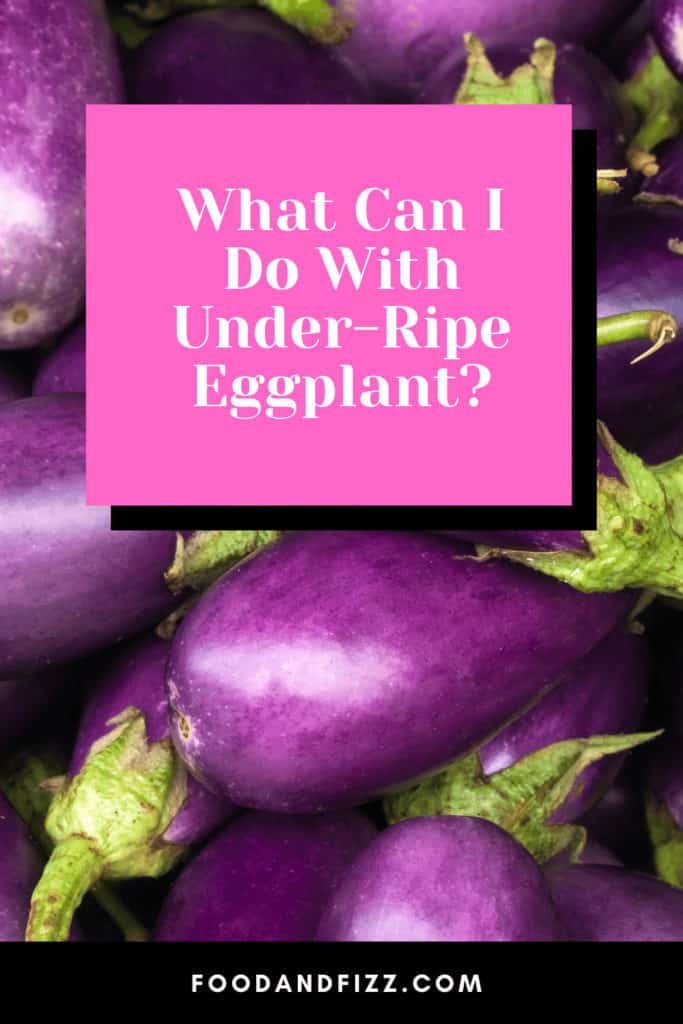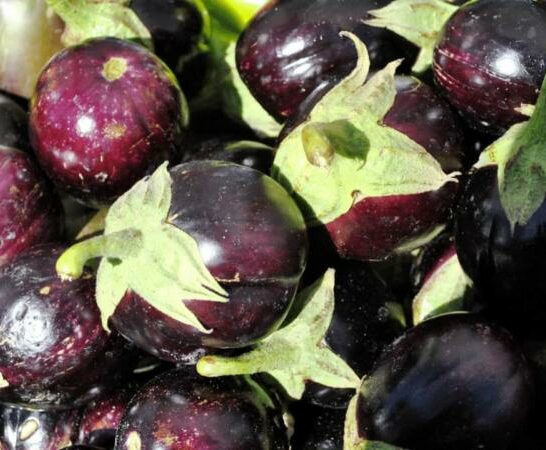When this year’s frost suddenly struck, my veggie garden took a real knock.
I tried to salvage what I could, but I ended up with a basket of under-ripe eggplants that I didn’t have a clue of what to do with.
What Can I Do With Under-Ripe Eggplant?
Concerned, I jumped online to my local horticultural society, where I got some great answers and a few recipes that turned out to have all the makings of firm family favorites.
It turns out that there was a lot I could do with under-ripe eggplant after all.
What Can I Do With Under-Ripe Eggplant?
Under-ripe eggplant or aubergines can be eaten if prepared correctly. Some people may be allergic to the solanine content that under-ripe nightshade family members have, but usually, it is safe to eat. Under-ripe eggplants can be ripened by placing the fruits in a brown paper bag on your window sill. After a few days, the fruit will begin to soften, and it will be more palatable. There are also several uses for under-ripe eggplant, such as soups, stews, and as a pickle.

Understanding Eggplant Ripeness
There are several levels of ripeness that eggplants develop.
From being overripe and brown in color, eggplant fruits can be raw or green when they are small and hard.
When the fruit is dull in color and easily makes an indentation when you press against it, then the eggplant fruit is overripe, and it will likely taste bitter and be spongy.
If the eggplant fruits are hard and have a dull half-purple or dark brown skin, then they are under-ripe and will be somewhat chewier than a ripe eggplant fruit.
Ripe eggplants will just start to soften to the touch.
The skin will be a dark purple, almost black color, and the shiny, almost waxy coating of the skin will also be a giveaway that the fruit is ripe according to the University of Maryland.
Sadly, eggplant fruits quickly become over-ripe, and it can be difficult to store them.
Yet, an under-ripe eggplant buys you a little more time for when to prepare it as the fruit is not yet fully ripe.
Safety of Under-Ripe Eggplant Fruits
Ripe eggplants change color, which means they contain less solanine.
Certain green vegetables such as potatoes, tomatoes, and cabbages contain a pigment called solanine, which gives it a unique green color.
This pigment can be highly toxic to those who have solanine sensitivity.
If you are sensitive to solanine, then you should avoid eating green or under-ripe vegetables.
Signs you have solanine sensitivity include arash, hives, vomiting, muscle tremors, and incoordination.
Be sure not to feed half-green vegetables like under-ripe eggplant to animals such as dogs and chickens as they can quickly sicken and die of it.
But what can I do with under-ripe eggplant?
Making Your Under-Ripe Eggplant Safe to Eat
Eggplant has a tendency toward being slightly bitter, but the under-ripe eggplant fruits are actually better tasting when compared to an over-ripe eggplant where the taste is harsh and bitter.
However, the risk of solanine poisoning makes correctly cooking an under-ripe eggplant essential.
Heat alone does not reduce the solanine levels in a half-green eggplant fruit.
Boiling your under-ripe eggplant fruit can help flush some of the solanine toxins from the eggplant.
The heat of cooking does not reduce solanine levels, but the toxin is flushed into the cooking water, and this can help lower the toxicity.
How to Ripen an Under-Ripe Eggplant
If you harvest your eggplant slightly before it is ripe, you can ripen it on the shelf.
Simply wrap your eggplant fruits in brown paper bags, then place them on a shelf in an area that is warm and where they will not be disturbed.
You will notice the skin darkens, and the fruit will soften to the touch. While the eggplant fruits may not fully ripen, they will become less under-ripe, making them safe for eating.
Storing a slightly under-ripe eggplant also has the benefit that it won’t spoil so quickly as an over-ripe eggplant will.
Simply place the eggplant in the fridge for up to a week and ripen it a few days before you serve it.
Whether ripe or slightly under-ripe, eggplant has several nutritional benefits, including antioxidants like vitamin A and C.
What Can I Do With Under-Ripe Eggplant?
3 Uses of Under-Ripe Eggplant Fruits
There are several ways that I found I could cook and serve my under-ripe eggplants. See which you prefer and why.
1. Eggplant Soup
An eggplant soup is a nourishing meal that many love.
Since the eggplant is cooked for this recipe, you can use under-ripe eggplant fruits as cooking removes some of the solanine.
This will ensure the eggplant is less bitter.
2. Eggplant Stew
You can also make a stew with eggplant fruit. The under-ripe fruit can be steamed and added to a watery stew.
This will ensure the eggplant fruit is soft enough to eat, though the fruit will remain slightly chewy.
3. Fried Eggplant
When you have a slightly under-ripe eggplant that you want to prepare, you can blanche the eggplant in hot water for a minute.
Then slice the eggplant before frying it and serving with parmesan cheese on toast.
Frequently Asked Questions About What Can I Do With Under-Ripe Eggplant
What happens if you eat an unripe eggplant?
It is safe to eat an unripe eggplant in moderation unless you are allergic. This means that when you eat an under-ripe eggplant and are allergic to solanine, you may experience an inflammatory response such as joint pain, hives, and other allergic responses.
How can you tell if an eggplant is not ripe?
Ripe eggplant fruits should be soft to the touch but firm. The flesh should be white with a green tint, and if you cut diagonally across the fruit, you should see the seeds clearly in the flesh.
How do you use an under-ripe eggplant?
Eggplant that is under-ripe will be slightly chewier, and while the ripe plant tastes better, it is still edible. Use under-ripe eggplant in a stew or soup, or sprinkle with cheese and roast.
Does eggplant ripen after it’s picked?
You can ripen eggplant off the vine. Simply place it in a paper bag, leave it on the counter in a warm spot to ripen. It may not ripen completely, but the flesh will soften when left for a few days.
Conclusion About What Can I Do With Under-Ripe Eggplant
Eggplants are nutritious and they make a great meal when roasted or stuffed.
In soups, they are also delicious, and while you may not always find a perfectly ripe eggplant, even an under-ripe eggplant can be edible if correctly prepared.

